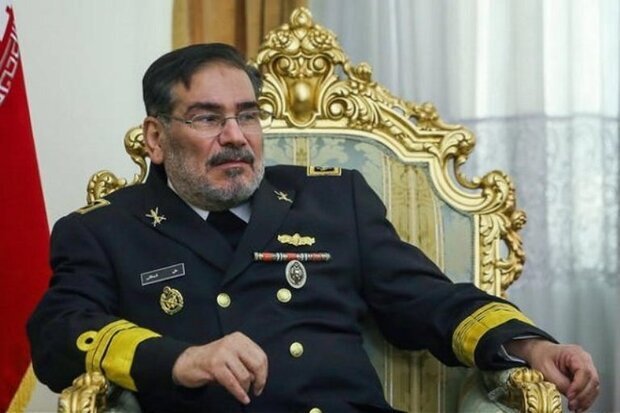
Shamkhani: U.S. trying to give new life to Daesh

Shamkani’s remarks came in a meeting with Alexander Lavrentiev, the special envoy of the Russian president, during which the sides discussed regional and international issues.
Pointing to the U.S. plot to revive Daesh and create insecurity in the Middle East, Shamkhani called on regional nations to be more vigilant about such plots and embark on close coordination to counter the ill-wishers’ destabilizing measures.
Shamkhani further condemned double-standard approach towards the issue of terrorism, including in the northwestern Syrian province of Idlib.
Officials and analysts have warned that the Turkish invasion of Syria will lead to reemergence of Daesh.
Turkey launched an offensive on the Syrian Democratic Forces (SDF) last week. This happened despite warnings by many countries including Iran, Russia, Egypt, China, India and European states.
The Syrian Kurdish fighters commonly referred to as the SDF, were instrumental in defeating Daesh.
Iran's Judiciary Chief Ebrahim Raisi on Monday expressed deep concern that Turkey's incursion into Syria would bring Daesh back to the stage.
There is a danger that Daesh which “has committed the biggest crimes in the region and their hands are stained with the regional people's blood to respire and commit crimes again", Fars quoted Raisi as saying.
Raisi expressed the hope that the Turkish government would pull back to international borders immediately.
Aid groups operating in northeastern Syria have raised the alarm about civilian casualties and an impending humanitarian crisis.
Shamkhani says Tehran will make assailants on Iranian oil tanker regretful
Elsewhere in his talks with the Russian president’s envoy, Shamkhani underscored that Tehran’s response to orchestrators and operators of the Friday missile attack on Iran’s SABITI oil tanker will be so harsh that will cause the assailants to feel regret.
Noting that insecurity in the international waterways is one of the most blatant causes of creating crisis in the region, Shamkhani said, “We will give crushing and regretful response to those who launched missile attack on the Iranian oil tanker in the Red Sea, which was aimed at escalating a fresh wave of tensions in the region.”
On Tuesday, Iranian Foreign Minister Mohammad Javad Zarif announced that “one or more countries” had directed or facilitated the attack on the oil tanker off the Saudi coast in the Red Sea.
Zarif also said the raid was a “state-sponsored act”.
He added, “According to received intelligence the Friday assault on the Iranian oil tanker was a complicated move done by one or more states.”
“Investigations are underway. We are not to accuse any government until we come to definite conclusions,” he mentioned.
President Rouhani also told a press conference on Monday that “what is clear is that a regime has done it with a support of certain countries.” Rouhani also told a press conference with the Pakistani prime minister in Tehran on Sunday that Iran has found some clues about the attack on the vessel but investigations are underway until a final conclusion is reached.
The Iranian Ports and Maritime Organization (PMO) announced in a statement posted on its official website that none of the regional maritime bodies responded to calls for help by the Iranian oil tanker SABITI when it came under missile attack.
“No regional maritime administration responded to calls for assistance by MT SABITI, and the Ports and Maritime Organization considers this in contrast and violation of international customary requirements, as well as humanitarian principles,” the PMO stated.
The PMO said it is releasing this statement to clarify the ambiguities surrounding the terrorist attack on SABITI and also disprove claims of intention to assist the vessel at the time of distress.
Source: Kayhan















